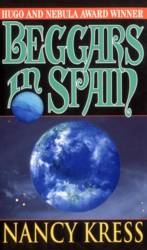

| Nancy Kress has her own home page. | ||
| Click on a book's image or title to order from Amazon.com |

Beggars in Spain
Avon, PB, © 1993, 438 pp, ISBN #0-380-71877-4Reviewed May 2001
In the early 21st century, medical science has learned how to enhance fetuses in utero so that when born, they will never need to sleep for the duration of their life. Beggars in Spain is Nancy Kress' famous novel about the impact these children have on the world during the course of the century. Leisha Camden is born to privilege when her rich father Roger pays for her enhancement. Unexpectedly, though, Leisha is born with a fraternal twin, Alice, who is not born "sleepless", and who serves as a constant counterpoint to Leisha's life.
It's soon learned that the Sleepless have additional privileges beyond the extra six-to-ten hours a day they can spend learning and doing things: They're more emotionally stable, the Sleepless geneset turns out to be dominant, and most of all, their genetic modification retards the aging process. In theory, they could be immortal.
The ensuing century sees the Sleepless gather huge financial wealth and power at the expense of prejudice and hatred from many "sleepers". A few Sleepless, like Leisha, believe that working with the Sleepers and integrating into society is the best solution to their differences, but most - led by the rich and fanatical Jennifer Sharifi - create an insular Sleepless society called Sanctuary from which they manage their assets and live among themselves.
Beggars reads much like a Connie Willis novel, with strong characters, but with more science content and a more serious tone. Leisha constantly feels herself torn between several different ways of living her life, working with Sleepers, with Sleepless, trying to make both "sides" of the conflict see how they're hurting themselves and each other, watching her sister have her own family, and seeing the social fabric of the United States change around her.
Intriguingly, Beggars also turns out to be a powerful anti-Libertarian statement: Leisha is a proponent of Yagaiism, which espouses the right of productive people to control their destinies, and the use of contracts for such people to interact with each other. But ultimately the sharp differences between the Sleepless and Sleepers underscores the difficulty they have in dealing with each other, the difficulty that a few have in being governed by a government created by the Many (or a different Few), and the responsibilities that all people have towards other people just because we're all human. It's probably not an argument that would persuade True Libertarians, but then its doctrinal nature puts Libertarians at an essential disadvantage in dealing with the greater culture of humanity.
As a novel, Beggars is a bit disjointed. The early part of the book explores the nature of the nascent Sleepless, while the middle section explores the extremes of the interaction between Sleepers and Sleepless. The final sections involve Sanctuary and the strange goings-on there. Leisha and Jennifer are the essential constants through the story, but it's a story of a burgeoning subculture and not of specific individuals. And although the book is based in genetic technology, a lot of the technology is handwaved in order to explore its effects. Which is not a terrible thing, but which makes the book feel slightly more simplistic than it ought to.
I'm not sure I enjoyed the book enough to continue on with its two sequels, but it is a solid and entertaining story.
hits since 13 May 2001.